2024年中考英语人教版专项复习 第十六讲 九年级 Units 1—2课件(共82张PPT)
文档属性
| 名称 | 2024年中考英语人教版专项复习 第十六讲 九年级 Units 1—2课件(共82张PPT) | 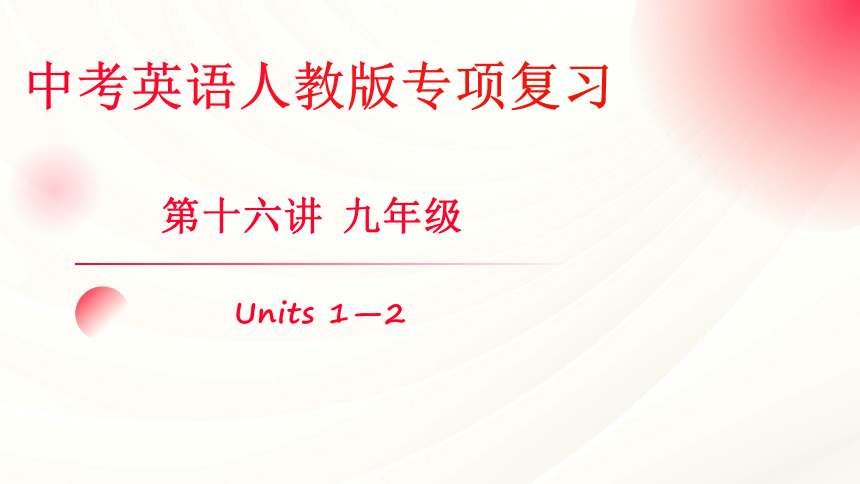 | |
| 格式 | pptx | ||
| 文件大小 | 1.2MB | ||
| 资源类型 | 教案 | ||
| 版本资源 | 人教新目标(Go for it)版 | ||
| 科目 | 英语 | ||
| 更新时间 | 2024-05-11 14:21:59 | ||
图片预览

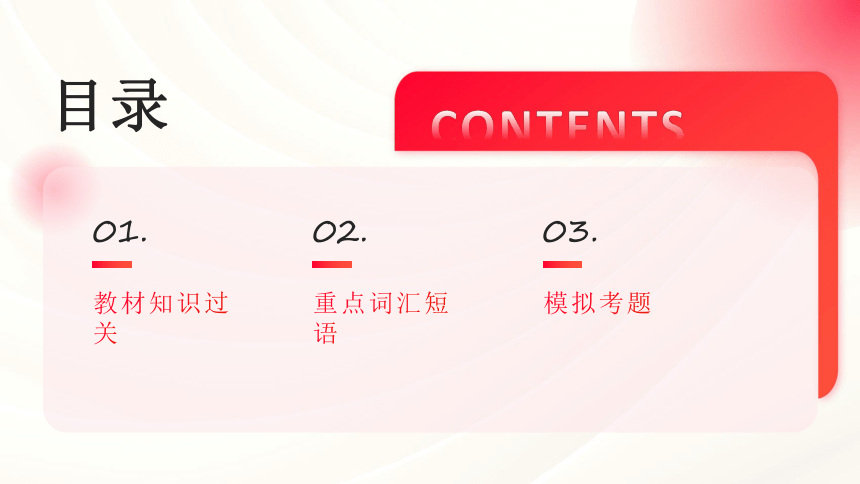
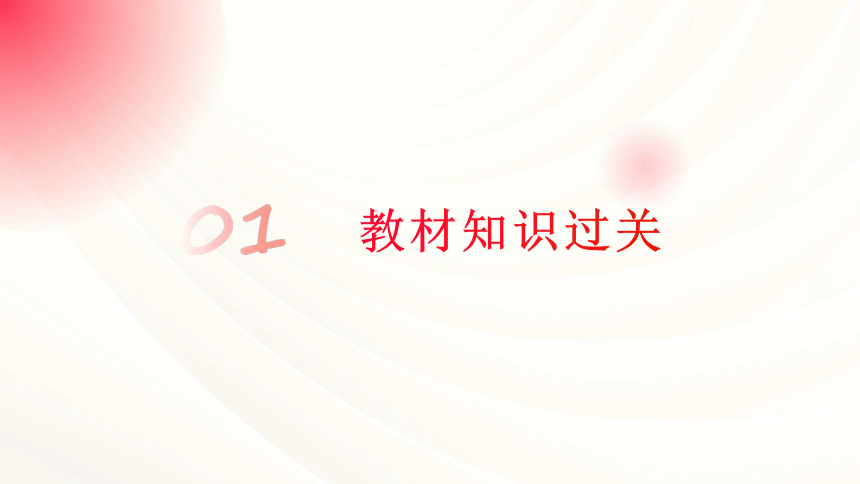
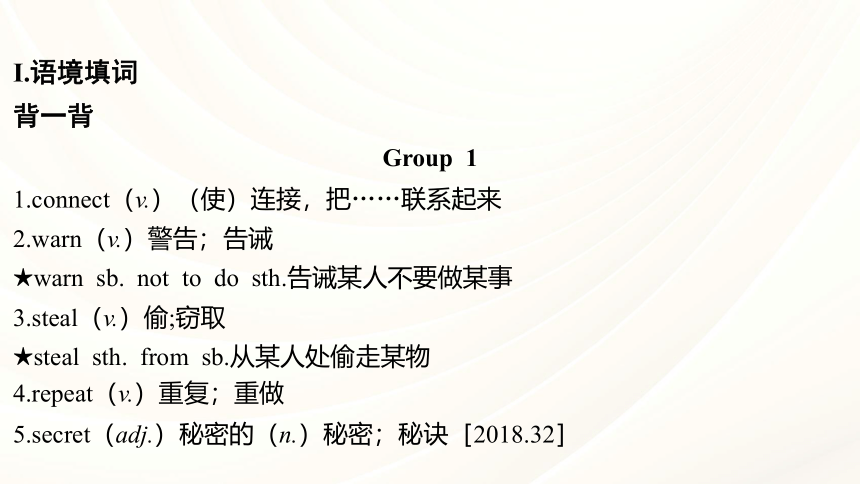
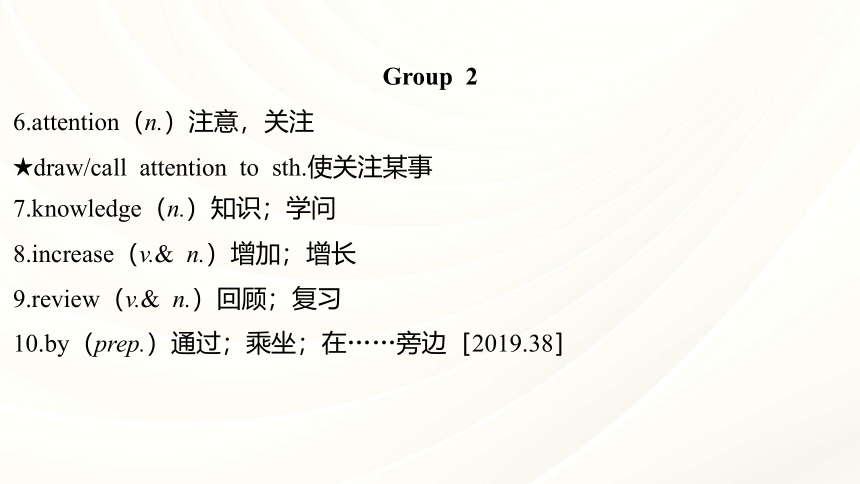
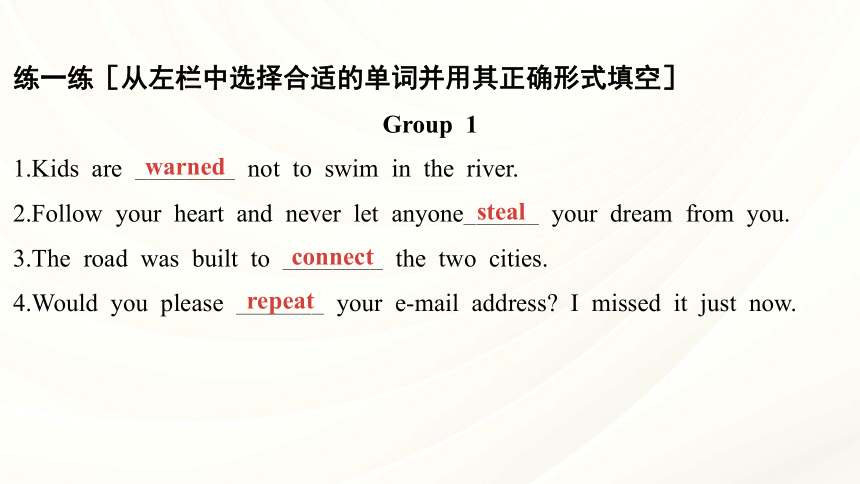
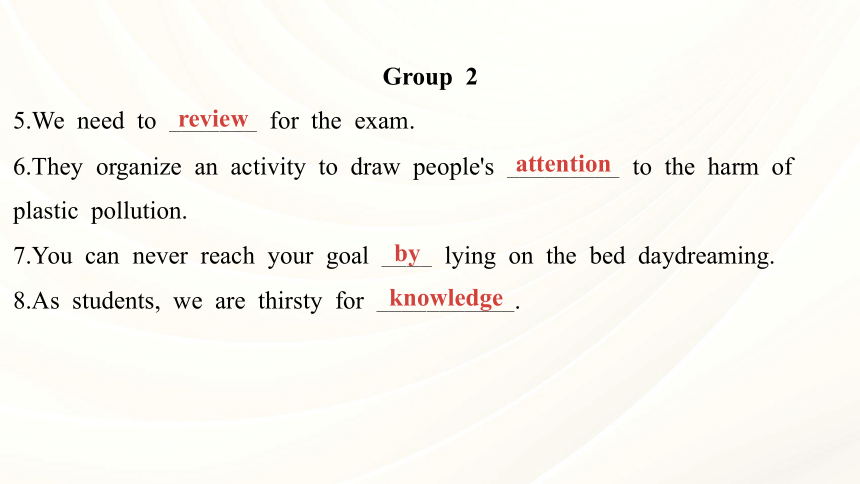
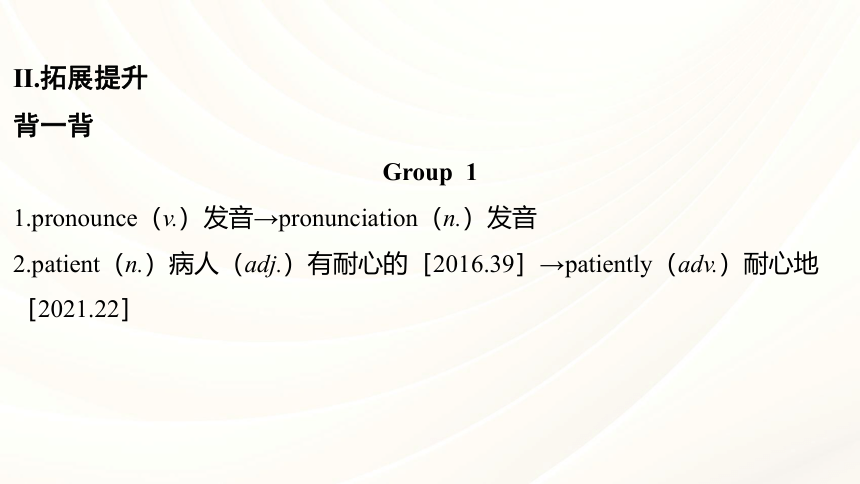
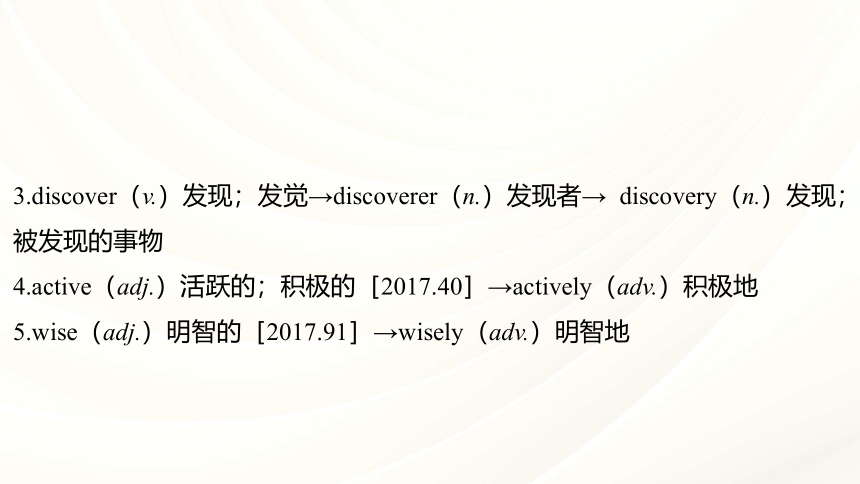
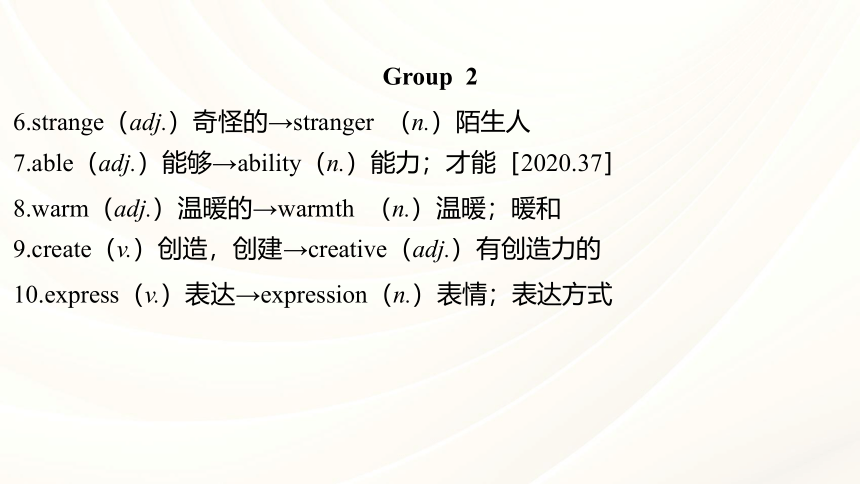
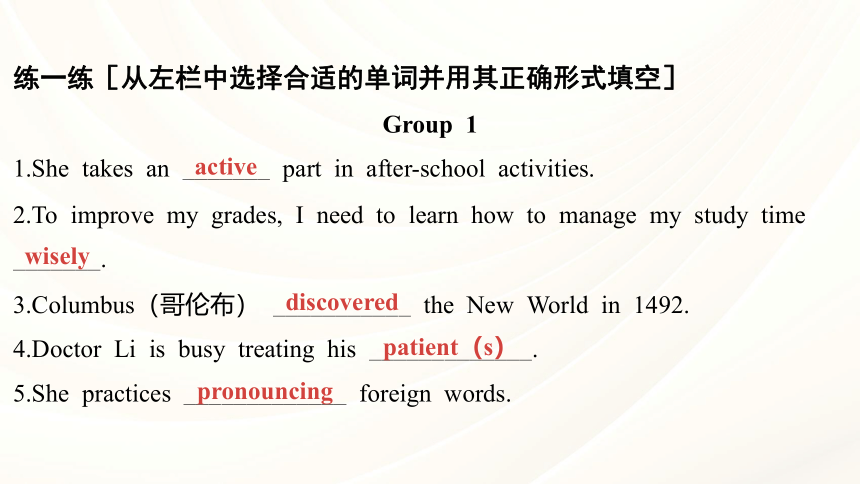
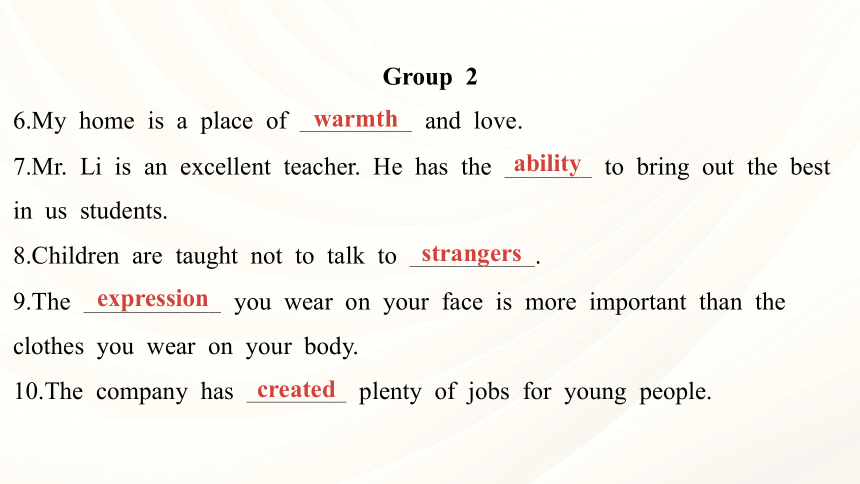
文档简介
(共82张PPT)
中考英语人教版专项复习
第十六讲 九年级
Units 1—2
目录
01.
教材知识过关
02.
重点词汇短语
03.
模拟考题
01
教材知识过关
Ⅰ.语境填词
背一背
Group 1
1.connect(v.)(使)连接,把……联系起来
2.warn(v.)警告;告诫
★warn sb. not to do sth.告诫某人不要做某事
3.steal(v.)偷;窃取
★steal sth. from sb.从某人处偷走某物
4.repeat(v.)重复;重做
5.secret(adj.)秘密的(n.)秘密;秘诀[2018.32]
Group 2
6.attention(n.)注意,关注
★draw/call attention to sth.使关注某事
7.knowledge(n.)知识;学问
8.increase(v.& n.)增加;增长
9.review(v.& n.)回顾;复习
10.by(prep.)通过;乘坐;在……旁边[2019.38]
练一练[从左栏中选择合适的单词并用其正确形式填空]
Group 1
1.Kids are ________ not to swim in the river.
warned
2.Follow your heart and never let anyone______ your dream from you.
steal
3.The road was built to ________ the two cities.
connect
4.Would you please _______ your e-mail address I missed it just now.
repeat
Group 2
5.We need to _______ for the exam.
review
6.They organize an activity to draw people's _________ to the harm of
plastic pollution.
attention
7.You can never reach your goal ____ lying on the bed daydreaming.
by
8.As students, we are thirsty for ___________.
knowledge
Ⅱ.拓展提升
背一背
Group 1
1.pronounce(v.)发音→pronunciation(n.)发音
2.patient(n.)病人(adj.)有耐心的[2016.39]→patiently(adv.)耐心地[2021.22]
3.discover(v.)发现;发觉→discoverer(n.)发现者→ discovery(n.)发现;被发现的事物
4.active(adj.)活跃的;积极的[2017.40]→actively(adv.)积极地
5.wise(adj.)明智的[2017.91]→wisely(adv.)明智地
Group 2
6.strange(adj.)奇怪的→stranger (n.)陌生人
7.able(adj.)能够→ability(n.)能力;才能[2020.37]
8.warm(adj.)温暖的→warmth (n.)温暖;暖和
9.create(v.)创造,创建→creative(adj.)有创造力的
10.express(v.)表达→expression(n.)表情;表达方式
练一练[从左栏中选择合适的单词并用其正确形式填空]
Group 1
1.She takes an _______ part in after-school activities.
active
2.To improve my grades, I need to learn how to manage my study time
_______.
wisely
3.Columbus(哥伦布) ___________ the New World in 1492.
discovered
4.Doctor Li is busy treating his _____________.
patient(s)
5.She practices _____________ foreign words.
pronouncing
Group 2
6.My home is a place of _________ and love.
warmth
7.Mr. Li is an excellent teacher. He has the _______ to bring out the best
in us students.
ability
8.Children are taught not to talk to __________.
strangers
9.The ___________ you wear on your face is more important than the
clothes you wear on your body.
expression
10.The company has ________ plenty of jobs for young people.
created
Ⅲ.短语填空
背一背
1.look up(在词典、参考书中或通过电脑)查阅;抬头看
2.take notes做笔记
3.be born with天生具有
★be born to do/be...天生适合做……/注定成为……
4.depend on取决于;视……而定;依靠
5.pay attention to注意;关注
6.put on增加(体重);穿上;上演
★put on a show上演节目
7.lay out摆开;布置
8.end up最终成为;最后处于
★end up doing... 最终做了……
练一练[从左栏中选择合适的短语并用其正确形式填空]
1.We'll ________ a show to raise money.
put on
2.Stop making calls while driving. ________________ the road!
Pay attention to
3.If you don't know what you want, you might ________ getting something
you don't want.
end up
4.Your future ____________ the choices you make today.
depends on
5.If you don't understand the meaning of a new word, _____ it ____ in the
dictionary.
look
up
6.Everyone is ___________ the ability to learn.
born with
Ⅳ.仿写运用
背一背
1.The more you read, the faster you'll be.你读得越多,你的速度就越快。
2.Even if you learn something well, you will forget it unless you use it.即使有些东西你学得很好,你如果不用它还是会忘记。
3.I want to learn new words and more grammar so that I can have a better understanding of English movies.我想学习新单词和更多的语法以便对英文电影有更好的理解。
练一练[完成下列句子]
1.你越细心,出的错就越少。
_________________ you are,___________________ you will make.
The more careful
the fewer mistakes
2.要全力以赴,即使这项任务似乎很难。
Try your best ________ the task seems very difficult.
even if
3.我们应当努力学习,以便将来成为有用的人。
We should study hard ________ we can become a useful person in the
future.
so that
考点1 by的用法[2019.38]
&1& You can become better by reading every day.你可以通过每天阅读来提升自我。
by作介词,常见用法如下:
(1)by boat/car/plane 乘船/汽车/飞机
(2)by the window/river 在窗边/河边
(3)by (doing) sth. 通过(做)某事
(4)by two o'clock 在两点之前
by/in/with
(1)by 表示通过或使用某种手段或方式,如:
He makes a living by writing. 他靠写作谋生。
(2)in表示使用某种语言或材料,如:
He wrote a letter in pencil. 他用铅笔写了一封信。
(3)with表示借助于某种具体的手段或工具,如:
He broke the window with a stone. 他用一块石头打破了那扇窗户。
语境小练
1.Don't read here. Go to read it ___ the window. It's much brighter there.
D
A.through B.on C.behind D.by
2.Success cannot be achieved overnight. You can only achieve it ___
working hard.
B
A.from B.by C.in D.with
3.___ the time I got to the bus stop, the bus had already left.
C
A.On B.In C.By D.For
4.Andy decided to buy some gifts for the homeless kids ___ his pocket
money.
A
A.with B.in C.by D.from
考点2 spread的用法[2020.25]
&2& I'll spread my wings and I'll learn how to fly. I'll do what it takes to fly until I touch the sky.我会展开翅膀,学习如何飞翔。我会不惜一切代价地去飞,直到我触及天空。
spread作动词,常见用法如下:
(1)表示"展开,张开,摊开"。如:
Her notes were spread all over the desk.她的笔记在书桌上摆得到处都是。
(2)表示"传播;散布;(使)流传"。如:
The fashion quickly spread from France to England.这股风尚迅速从法国传到了英格兰。
(3)表示"(使)蔓延;扩散;散开"。如:
The fire spread quickly through the building.火势迅速蔓延到大楼各处。
语境小练
5.If you don't know the whole story, don't tell anyone about it. Don't ___
things that you're not sure about.
C
A.discover B.promise C.spread D.serve
6.More and more people have realized the importance of learning and ___
our traditional culture.
C
A.guiding B.causing C.spreading D.providing
考点3 patient的用法[2016.39]
&3& Be patient. Remember good things take time.耐心点。记住好事多磨。
patient作形容词时,意为"有耐心的;能忍耐的"。be patient with sb./sth. 表示"对某人/某事有耐心"。如:
She is very patient with young children.她对小孩特别有耐心。
patiently为副词,意为"耐心地"[2021.22]。如:
The teacher patiently explained the new teaching materials.老师耐心地讲解了新教材。
patient作名词时,意为"病人",为可数名词。如:
treat a patient 给病人治疗
examine a patient 给病人做检查
see a patient 给病人看病
语境小练
7.Don't hurry him. You will just have to be ___ and wait until he finishes
the work.
C
A.active B.careful C.patient D.famous
8.Since Tom was a slow learner, Mr. Green ___ explained the problem to
him again and again.
C
A.excitedly B.secretly C.patiently D.suddenly
9.We should be ___ with the difficult problem, because it cannot be solved
overnight.
A
A.patient B.angry C.strict D.popular
考点4 create,discover和invent的辨析
&4& These products can surely change the world and create a better world for people.这些产品无疑能够改变世界并为人们创造一个更好的世界。
create 产生,创造 指创造出新的东西,其对象既可以是精神上
的,也可以是具体的事物
discover 发现 指发现自然界中本来存在的,但之前未被人发
现或认识的事物
invent 发明,创造 指创造出自然界不存在的东西,尤其是科技上
的发明创造
①Dickens created some unforgettable characters.狄更斯创作出了一些令人难忘的角色。
②Scientists have discovered a new plant.科学家发现了一种新植物。
③The first bulb in the world was invented in 1854. 世界上第一个电灯泡是在1854年被发明的。
语境小练
10.He is a great artist and has ___ a whole new language of painting.
B
A.checked B.created C.ordered D.refused
11.—This piece of music sounds so special.
—So it is. It was ___ by Professor Lee, the most popular teacher in our
university.
C
A.set B.built C.created D.fixed
12.—What's your plan for the holiday
—I plan to spend a week ___ the beauty of Mount Huang.
D
A.reviewing B.separating C.repeating D.discovering
考点5 warn的用法
&5& Scientists have warned us about the dangers of climate change.科学家已经告诫了我们气候变化的危害。
warn作动词,意为"警告;告诫;提醒"。常见用法:
warn sb. about/of sth. 提醒某人注意某事/物
warn sb. (not) to do sth. 告诫某人(勿)做某事
warn sb.+that... 警告/提醒某人……
①The book warns people about/of the dangers of not getting enough exercise.这本书警示人们运动不足所带来的危害。
②She's warned not to go there.她被警告不要去那里。
③I warn you that it's dangerous.我提醒你那很危险。
语境小练
13.He saw a snake and shouted to ___ us of the danger.
D
A.present B.hear C.answer D.warn
14.We ___ not to eat the fish, because it was no longer fresh.
B
A.warned B.were warned C.have warned D.are warned
15.I was stopped for speeding, but instead of punishing me, the policeman
just gave me a ___.
C
A.tradition B.question C.warning D.promise
考点6 lie的用法
&6& We need to prepare ourselves as early as possible to overcome the difficulties that lie ahead. 我们需要尽可能早地做准备以克服以后的困难。
lie作动词时,有如下意义及用法:
意为"存在;在于"。lie in sth.在于……意为"平躺;位于"。lie on the bed躺在床上
意为"说谎"。lie to sb.对某人说谎
lie作名词时,意为"谎言"。常见搭配:
tell (sb.) a lie (对某人)撒谎
lie/lay
含义 过去式 过去分词 现在分词
lie 存在;平躺;位于 lay lain lying
说谎 lied lied lying
lay 放置;安放;产(卵);下(蛋) laid laid laying
语境小练
16.—I don't believe that he would do things like that!
—I don't believe that, either. But cameras cannot ___.
B
A.explain B.lie C.move D.think
17.Tom ________ down his book and ________ down on the sofa.( )
A
A.laid; lay B.lay; laid C.lay; lay D.laid; laid
18.David is an honest boy. He never ___.
D
A.agrees B.cries C.changes D.lies
19.Jessica, go and ___ on the bed until you feel better.
D
A.hit B.knock C.call D.lie
课标新增词汇速递
1 partner / pɑ tn /
含义 n.搭档;同伴 v.结成伙伴;做搭档
例句 ●She asked Mary if she could be her partner, and Mary agreed.
●I used to partner him in tennis matches.
2 admire / d ma /
含义 v.钦佩;欣赏
搭配 admire sb. for (doing) sth.钦佩某人(做)某事
例句 ●I admire his spirit of never giving up.
●Families often get together and admire the full moon on the Mid-Autumn night.
3 tradition /tr d n/
含义 n.传统,传统习俗
搭配 follow a tradition遵循传统
拓展 traditional adj.传统的,习俗的
例句 ●Our family has a tradition of a family gathering every New Year's Eve.
●That day, she enjoyed the beauty of hanfu and experienced the traditional culture.[2023陕西中考]
4 folk /f k/
含义 adj.传统民间的;民俗的
例句 ●I've been interested in folk customs since I was young.
●There are many people learning traditional Chinese folk arts.
从所给的选项中,选出加黑单词的汉语意思。
1.note
A.n.笔记;记录 B.v.注意;留意
(1)I left you a note on the kitchen table.___
A
(2)Please note that the office will be closed on Monday.___
B
2.present
A.n.现在 B.adj.出席的;在场的
C.v.赠送;授予
(1)There were 100 people present at the meeting.___
B
(2)The winners were presented with medals.___
C
(3)Stop worrying about the past and live in the present.___
A
3.treat
A.n.招待 B.v.请客 C.v.医治
D.v.以……态度对待
(1)Young people should always treat their elders with respect.___
D
(2)Put your money away — I'm going to treat you to this.___
B
(3)She was treated for heart disease.___
C
4.relative
A.n.亲戚;亲属
B.adj.(~to)关于(或涉及)……的
(1)We will discuss matters relative to the sports meeting.___
B
(2)Do relatives of yours still live in Lijiang ___
A
Ⅰ.单项填空
1.[2021安徽中考] The dancing teacher gives us instruction ___ until we
are perfect in every move.
A
A.patiently B.quickly C.bravely D.suddenly
2.[2020安徽中考] —Hi, Jill. I'd like to share with you the latest news
about the height of Qomolangma.
—Really Make sure the news is true before you ___ it.
B
A.receive B.spread C.cancel D.hear
3.[2019安徽中考] On sunny days, my grandma often reads a novel___the
window.
A
A.by B.for C.with D.from
4.[2018安徽中考] —What is the ___ of your excellent spoken English
—Practice makes perfect!
D
A.result B.influence C.duty D.secret
5.[2017安徽中考] My deskmate is really ___. She likes to attend different
activities after school.
A
A.active B.quiet C.lazy D.honest
6.[2023宿迁中考] —The girl's beautiful pronunciation caught our ___ in
yesterday's English speech competition.
—Yes, many students couldn't help cheering for her.
B
A.condition B.attention C.invention D.position
7.[2023滨州中考] —Our parents often ___ us not to talk with strangers on
the Internet.
—That's true. As teenagers, we should learn to protect ourselves.
A
A.warn B.invite C.control D.promise
8.[2023牡丹江中考改编] We should spend our pocket money(零花钱)___
and use it to do something meaningful.
C
A.quietly B.politely C.wisely D.quickly
Ⅱ.单词拼写
1.Skill i_________(增长) with practice.
ncreases
2.My mother always w_______(告诫) me to be honest when I was
young.
arned
3.I enjoy being a______(活跃的). It is part of my lifestyle.
ctive
4.Lessons in life will be r________(重复) until they are learned.
epeated
5.Schools are good places for students to get k__________(知识) and
make friends.
nowledge
02
重点词汇短语
1._____________ (n.)交谈;谈话
conversation
2._______ (adv.)大声地;出声地
aloud
3._______ (n.)秘密;秘诀 (adj.)秘密的;保密的
secret
4.__________ (n.)语法
grammar
5._______ (v.)重复;重做
repeat
6.________ (n.)物理;物理学
physics
7.__________ (n.)化学
chemistry
8._________ (v.)增加;增长
increase
9._______ (v.& n.)回顾;复习
review
10._______ (n.)英镑(英国货币单位)
pound
11.________ (n.)花园;园子
garden
12.______ (n.)款待;招待 (v.)招待;请(客);对待
treat
13.______ (v.)警告;告诫
warn
1.pronounce (v.)→______________ (n.)发音
pronunciation
2.patience (n.)→________ (adj.)有耐心的 (n.) 病人 →__________
(adj.)没有耐心的;没有耐性的
patient
impatient
3.express(v.)→___________(n.)表情;表示;表达方式
expression
4.discover (v.)→__________ (n.)发现
discovery
5.able(adj.)→_______(n.)能力;才能→________(adj.)不会的;不能
的
ability
unable
6.create (v.)→________(adj.)有创造力的→_________(n.)创造(物);
作品
creative
creation
7.active (adj.)→________ (adv.)活跃地;积极地→________(n.)活动
actively
activity
8.connect(v.)→___________ (n.)连接;联系
connection
9.knowledge (n.)→______________ (adj.)知识渊博的
knowledgeable
10.wise(adj.)→_______ (adv.)明智地;聪明地→________(n.)智慧
wisely
wisdom
11.strange (adj.)→_________(n.) 陌生人
stranger
12.steal (v.)→______(过去式)→_______(过去分词)偷;窃取
stole
stolen
13.lay (v.)→_____(过去式/过去分词)放置;安放;产(卵);下(蛋)
laid
14.lie (v.)→____(过去式)→_____(过去分词)存在;平躺;处于
lay
lain
15.die(v.)→______(adj.)死的;失去生命的→_______ (n.)死亡;去
世
dead
death
16.punish (v.)→____________ (n.)处罚;惩罚
punishment
17.warm (adj.)→_________(n.)温暖;暖和
warmth
18.spread (v.& n.)→_______(过去式/过去分词)传播
spread
1._________(在词典、参考书中或通过电脑)查阅;抬头看
look up
2.___________做笔记
take notes
3.______________天生具有
be born with
4.___________取决于;视……而定
depend on
5.________________注意;关注
pay attention to
6.______________把……和……连接或联系起来
connect...with
7.________增加(体重);发胖;穿上
put on
8._____________和……相似
be similar to
9.________摆开;布置
lay out
10.________最终成为;最后处于
end up
●谈论如何学习
1.—How do you learn English 你是怎样学英语的?
—________________________________. 我通过小组学习的方式来学习。
I learn by studying with a group
2.—______________________ 我怎样读得更快些呢?
—You can read faster by reading word groups.通过读词组你可以读得更快。
How can I read faster
3.—How can I improve my pronunciation 我怎样才能改善我的发音呢?
—_______________________________________.一种方法就是听英语歌曲。
One way is by listening to English songs
●谈论节日
4.—What do you like best about the Dragon Boat Festival 关于端午节你最
喜欢什么?
—I love races.________________________________.我喜欢龙舟赛。我认为
观看它们很有趣。
I think that they're fun to watch
5.—What do you like most about this festival 关于这个节日你最喜欢什么?
—_______________________________________________!我认为装扮成卡通
人物很有趣。
I think it's fun to dress up as cartoon characters
03
模拟考题
Ⅰ.单项填空
1.[2023安庆一模] —What's your ___ of having so many good friends
—Being honest and kind.
B
A.degree B.secret C.coach D.excuse
2.[2023合肥瑶海区二模] My sister is getting ___ in group work and is not
afraid to share her ideas.
C
A.weak B.quiet C.active D.nervous
3.—Henry, did you drive back to your hometown during the Spring Festival
—No, I was ___ to take the train because the traffic is often the busiest at
that time.
D
A.praised B.taught C.warned D.advised
4.My father grew up ___ the sea, so he has been able to swim since he
was a little kid.
C
A.for B.under C.by D.behind
5.—Let's plan a surprise party for our teacher. What's your idea
—Why not ___ a play
B
A.put out B.put on C.put up D.put off
6.—The volunteers are really ___ to explain to the old how to use WeChat.
—Yes, and I'm moved when seeing them do it again and again.
B
A.friendly B.patient C.satisfied D.bright
7.To get better grades and be healthier, we should plan our time more ___.
A
A.wisely B.politely C.widely D.hardly
8.We will make fewer mistakes ___ we are careful enough.
A
A.as long as B.so that C.as far as D.even if
9.—I wonder ___ Dr Li will be at work tomorrow, sir.
—I'm not sure. He is volunteering in a community.
B
A.how B.if C.why D.when
10.—What do you think of the TV program
—___.
C
A.You are welcome B.Good luck C.I love it D.Cheer up
Ⅱ.完形填空
"我"的中文学习经历
The Chinese language is said to be difficult to learn. Is this true In my opinion, it depends.
At the age of 13, I started _1._ Chinese classes at school in the UK. It was a subject that could make the classroom deadly silent _2._ it was difficult to learn. But when I came to China last year, I found that learning Chinese could be _3._
After I moved to Beijing, I lived with local people. As a language lover, I would try to talk with local people in Chinese, _4._ details(琐事) of our everyday life. Sometimes we would also go to KTV together.
When I _5._ into the KTV room for the first time, the atmosphere(气氛) there was _6._ different from that of a classroom. But this was where _7._ would take place. With every note I sang, I began to _8._ the characters. Spending time with others made the process of learning less like work and more like _9._. As I sang with native Chinese speakers, the _10._ of words finally began to click(被突然明白). This was an environment where I could lose myself in the Chinese language and culture while still expressing myself.
1.( ) A.organizing B.answering C.leaving D.taking
D
2.( ) A.because B.unless C.though D.but
A
3.( ) A.kind B.surprising C.direct D.enjoyable
D
4.( ) A.hearing B.teaching C.sharing D.explaining
C
5.( ) A.turned B.divided C.stepped D.fell
C
6.( ) A.deeply B.completely C.privately D.rapidly
B
7.( ) A.event B.rest C.tour D.learning
D
8.( ) A.write B.forget C.understand D.test
C
9.( ) A.fun B.dream C.joke D.exam
A
10.( ) A.meaning B.game C.list D.group
A
Ⅲ.阅读理解
A[原创新题]
阅读技巧
Scanning and skimming(泛读和跳读) are two skills you use with speed. They can help you find information fast.
Scanning is a skill good readers use to find out if the material is what they want. When you scan, you don't read all the material. You only read a little bit here and there to learn what the material is about.
For example, you may be interested in horses and find a book in the library called The Great Iron Horse. However, as you look through the book, you discover it is not a book about the horse, but the train. You would be glad you've scanned the book first before checking it out!
Skimming is a similar skill to scanning. You don't read the whole material. You know what information you are looking for. Then you skim the material just for that information. In skimming, you look at titles, subheadings(小标题), and words in italics and boldface. These may give you clues to where you can find the information you need.
For example, if you are looking for information on the date of Marco Polo's journeys, you would first skim the titles and subheadings to see if there was information on Marco Polo. Having found a part on Marco Polo, you would skim to find the subheading on his journeys. Then you would skim this part to look for a date.
1.What is The Great Iron Horse about ( )
C
A.The library. B.The horse. C.The train. D.The book.
2.What does the underlined word "clues" mean in Chinese ( )
A
A.线索 B.主旨 C.理由 D.要求
3.Which is the missing part in the chart(图表) ( )
D
A.Check to see if it is about Marco Polo.
B.Read here and there to look for the date.
C.Look through the book and scan the pages.
D.Find the subheading on Marco Polo's journeys.
4.What does the text mainly talk about ( )
B
A.How to find key words. B.How to read with speed.
C.How to understand titles. D.How to get the main idea.
B[2023十堰中考改编]
授人以鱼,不如授人以渔
Pound was a famous professor of Harvard Law School. Although he was 80, he still worked eight hours every day.
His workmate once said, "He kept on walking from his house to the office. It would take him an hour to do so, but he insisted(坚持) because it gave him a sense of success. I admired him. He not only made great achievements in his field, but also came up with creative teaching methods."
One day, a student got out of the professor's office with a lot of books. He complained(抱怨), "He always answers my questions with just a yes or no. At the same time, he always gives me too many books and advises me to read them. I have to spend plenty of time finding the answers on my own."
By accident, the professor knew what the student complained about. He explained to him patiently, "This is the secret to success I have learnt — the harder you work independently, the better methods you will get. If you can make full use of the books, you will probably become a good lawyer." He believed "Teaching people to fish is better than giving them fish".
Years later, the student became a well-known lawyer. When he returned to Harvard Law School, he met the professor again.____
5.Why did the professor keep on walking to his office?(不超过10个词)
______________________________________
Because it gave him a sense of success.
6.What was the secret to success the professor taught to his student (不超
过15个词)
_________________________________________________________________
The harder you work independently, the better methods you will get.
7.新考法·开放性设问 What would the student do when he met the
professor (不超过15个词)
__________________________________________________________________
__________
He would thank the professor./He would express his thanks to the professor./...
Ⅳ.单词拼写
1.The sun was shining and the sky was blue. It was very w_____(温暖
的).
arm
2.Guests can c_______(连接) to the Internet from their hotel rooms.
onnect
3.Sometimes the direction is much more important than s______(速度).
peed
4.During the Spring Festival, much of our time is spent visiting r________
(亲戚).
elatives
5.T_____(对待) people with respect and they will do the same to you.
reat
非常感谢您的观看
中考英语人教版专项复习
第十六讲 九年级
Units 1—2
目录
01.
教材知识过关
02.
重点词汇短语
03.
模拟考题
01
教材知识过关
Ⅰ.语境填词
背一背
Group 1
1.connect(v.)(使)连接,把……联系起来
2.warn(v.)警告;告诫
★warn sb. not to do sth.告诫某人不要做某事
3.steal(v.)偷;窃取
★steal sth. from sb.从某人处偷走某物
4.repeat(v.)重复;重做
5.secret(adj.)秘密的(n.)秘密;秘诀[2018.32]
Group 2
6.attention(n.)注意,关注
★draw/call attention to sth.使关注某事
7.knowledge(n.)知识;学问
8.increase(v.& n.)增加;增长
9.review(v.& n.)回顾;复习
10.by(prep.)通过;乘坐;在……旁边[2019.38]
练一练[从左栏中选择合适的单词并用其正确形式填空]
Group 1
1.Kids are ________ not to swim in the river.
warned
2.Follow your heart and never let anyone______ your dream from you.
steal
3.The road was built to ________ the two cities.
connect
4.Would you please _______ your e-mail address I missed it just now.
repeat
Group 2
5.We need to _______ for the exam.
review
6.They organize an activity to draw people's _________ to the harm of
plastic pollution.
attention
7.You can never reach your goal ____ lying on the bed daydreaming.
by
8.As students, we are thirsty for ___________.
knowledge
Ⅱ.拓展提升
背一背
Group 1
1.pronounce(v.)发音→pronunciation(n.)发音
2.patient(n.)病人(adj.)有耐心的[2016.39]→patiently(adv.)耐心地[2021.22]
3.discover(v.)发现;发觉→discoverer(n.)发现者→ discovery(n.)发现;被发现的事物
4.active(adj.)活跃的;积极的[2017.40]→actively(adv.)积极地
5.wise(adj.)明智的[2017.91]→wisely(adv.)明智地
Group 2
6.strange(adj.)奇怪的→stranger (n.)陌生人
7.able(adj.)能够→ability(n.)能力;才能[2020.37]
8.warm(adj.)温暖的→warmth (n.)温暖;暖和
9.create(v.)创造,创建→creative(adj.)有创造力的
10.express(v.)表达→expression(n.)表情;表达方式
练一练[从左栏中选择合适的单词并用其正确形式填空]
Group 1
1.She takes an _______ part in after-school activities.
active
2.To improve my grades, I need to learn how to manage my study time
_______.
wisely
3.Columbus(哥伦布) ___________ the New World in 1492.
discovered
4.Doctor Li is busy treating his _____________.
patient(s)
5.She practices _____________ foreign words.
pronouncing
Group 2
6.My home is a place of _________ and love.
warmth
7.Mr. Li is an excellent teacher. He has the _______ to bring out the best
in us students.
ability
8.Children are taught not to talk to __________.
strangers
9.The ___________ you wear on your face is more important than the
clothes you wear on your body.
expression
10.The company has ________ plenty of jobs for young people.
created
Ⅲ.短语填空
背一背
1.look up(在词典、参考书中或通过电脑)查阅;抬头看
2.take notes做笔记
3.be born with天生具有
★be born to do/be...天生适合做……/注定成为……
4.depend on取决于;视……而定;依靠
5.pay attention to注意;关注
6.put on增加(体重);穿上;上演
★put on a show上演节目
7.lay out摆开;布置
8.end up最终成为;最后处于
★end up doing... 最终做了……
练一练[从左栏中选择合适的短语并用其正确形式填空]
1.We'll ________ a show to raise money.
put on
2.Stop making calls while driving. ________________ the road!
Pay attention to
3.If you don't know what you want, you might ________ getting something
you don't want.
end up
4.Your future ____________ the choices you make today.
depends on
5.If you don't understand the meaning of a new word, _____ it ____ in the
dictionary.
look
up
6.Everyone is ___________ the ability to learn.
born with
Ⅳ.仿写运用
背一背
1.The more you read, the faster you'll be.你读得越多,你的速度就越快。
2.Even if you learn something well, you will forget it unless you use it.即使有些东西你学得很好,你如果不用它还是会忘记。
3.I want to learn new words and more grammar so that I can have a better understanding of English movies.我想学习新单词和更多的语法以便对英文电影有更好的理解。
练一练[完成下列句子]
1.你越细心,出的错就越少。
_________________ you are,___________________ you will make.
The more careful
the fewer mistakes
2.要全力以赴,即使这项任务似乎很难。
Try your best ________ the task seems very difficult.
even if
3.我们应当努力学习,以便将来成为有用的人。
We should study hard ________ we can become a useful person in the
future.
so that
考点1 by的用法[2019.38]
&1& You can become better by reading every day.你可以通过每天阅读来提升自我。
by作介词,常见用法如下:
(1)by boat/car/plane 乘船/汽车/飞机
(2)by the window/river 在窗边/河边
(3)by (doing) sth. 通过(做)某事
(4)by two o'clock 在两点之前
by/in/with
(1)by 表示通过或使用某种手段或方式,如:
He makes a living by writing. 他靠写作谋生。
(2)in表示使用某种语言或材料,如:
He wrote a letter in pencil. 他用铅笔写了一封信。
(3)with表示借助于某种具体的手段或工具,如:
He broke the window with a stone. 他用一块石头打破了那扇窗户。
语境小练
1.Don't read here. Go to read it ___ the window. It's much brighter there.
D
A.through B.on C.behind D.by
2.Success cannot be achieved overnight. You can only achieve it ___
working hard.
B
A.from B.by C.in D.with
3.___ the time I got to the bus stop, the bus had already left.
C
A.On B.In C.By D.For
4.Andy decided to buy some gifts for the homeless kids ___ his pocket
money.
A
A.with B.in C.by D.from
考点2 spread的用法[2020.25]
&2& I'll spread my wings and I'll learn how to fly. I'll do what it takes to fly until I touch the sky.我会展开翅膀,学习如何飞翔。我会不惜一切代价地去飞,直到我触及天空。
spread作动词,常见用法如下:
(1)表示"展开,张开,摊开"。如:
Her notes were spread all over the desk.她的笔记在书桌上摆得到处都是。
(2)表示"传播;散布;(使)流传"。如:
The fashion quickly spread from France to England.这股风尚迅速从法国传到了英格兰。
(3)表示"(使)蔓延;扩散;散开"。如:
The fire spread quickly through the building.火势迅速蔓延到大楼各处。
语境小练
5.If you don't know the whole story, don't tell anyone about it. Don't ___
things that you're not sure about.
C
A.discover B.promise C.spread D.serve
6.More and more people have realized the importance of learning and ___
our traditional culture.
C
A.guiding B.causing C.spreading D.providing
考点3 patient的用法[2016.39]
&3& Be patient. Remember good things take time.耐心点。记住好事多磨。
patient作形容词时,意为"有耐心的;能忍耐的"。be patient with sb./sth. 表示"对某人/某事有耐心"。如:
She is very patient with young children.她对小孩特别有耐心。
patiently为副词,意为"耐心地"[2021.22]。如:
The teacher patiently explained the new teaching materials.老师耐心地讲解了新教材。
patient作名词时,意为"病人",为可数名词。如:
treat a patient 给病人治疗
examine a patient 给病人做检查
see a patient 给病人看病
语境小练
7.Don't hurry him. You will just have to be ___ and wait until he finishes
the work.
C
A.active B.careful C.patient D.famous
8.Since Tom was a slow learner, Mr. Green ___ explained the problem to
him again and again.
C
A.excitedly B.secretly C.patiently D.suddenly
9.We should be ___ with the difficult problem, because it cannot be solved
overnight.
A
A.patient B.angry C.strict D.popular
考点4 create,discover和invent的辨析
&4& These products can surely change the world and create a better world for people.这些产品无疑能够改变世界并为人们创造一个更好的世界。
create 产生,创造 指创造出新的东西,其对象既可以是精神上
的,也可以是具体的事物
discover 发现 指发现自然界中本来存在的,但之前未被人发
现或认识的事物
invent 发明,创造 指创造出自然界不存在的东西,尤其是科技上
的发明创造
①Dickens created some unforgettable characters.狄更斯创作出了一些令人难忘的角色。
②Scientists have discovered a new plant.科学家发现了一种新植物。
③The first bulb in the world was invented in 1854. 世界上第一个电灯泡是在1854年被发明的。
语境小练
10.He is a great artist and has ___ a whole new language of painting.
B
A.checked B.created C.ordered D.refused
11.—This piece of music sounds so special.
—So it is. It was ___ by Professor Lee, the most popular teacher in our
university.
C
A.set B.built C.created D.fixed
12.—What's your plan for the holiday
—I plan to spend a week ___ the beauty of Mount Huang.
D
A.reviewing B.separating C.repeating D.discovering
考点5 warn的用法
&5& Scientists have warned us about the dangers of climate change.科学家已经告诫了我们气候变化的危害。
warn作动词,意为"警告;告诫;提醒"。常见用法:
warn sb. about/of sth. 提醒某人注意某事/物
warn sb. (not) to do sth. 告诫某人(勿)做某事
warn sb.+that... 警告/提醒某人……
①The book warns people about/of the dangers of not getting enough exercise.这本书警示人们运动不足所带来的危害。
②She's warned not to go there.她被警告不要去那里。
③I warn you that it's dangerous.我提醒你那很危险。
语境小练
13.He saw a snake and shouted to ___ us of the danger.
D
A.present B.hear C.answer D.warn
14.We ___ not to eat the fish, because it was no longer fresh.
B
A.warned B.were warned C.have warned D.are warned
15.I was stopped for speeding, but instead of punishing me, the policeman
just gave me a ___.
C
A.tradition B.question C.warning D.promise
考点6 lie的用法
&6& We need to prepare ourselves as early as possible to overcome the difficulties that lie ahead. 我们需要尽可能早地做准备以克服以后的困难。
lie作动词时,有如下意义及用法:
意为"存在;在于"。lie in sth.在于……意为"平躺;位于"。lie on the bed躺在床上
意为"说谎"。lie to sb.对某人说谎
lie作名词时,意为"谎言"。常见搭配:
tell (sb.) a lie (对某人)撒谎
lie/lay
含义 过去式 过去分词 现在分词
lie 存在;平躺;位于 lay lain lying
说谎 lied lied lying
lay 放置;安放;产(卵);下(蛋) laid laid laying
语境小练
16.—I don't believe that he would do things like that!
—I don't believe that, either. But cameras cannot ___.
B
A.explain B.lie C.move D.think
17.Tom ________ down his book and ________ down on the sofa.( )
A
A.laid; lay B.lay; laid C.lay; lay D.laid; laid
18.David is an honest boy. He never ___.
D
A.agrees B.cries C.changes D.lies
19.Jessica, go and ___ on the bed until you feel better.
D
A.hit B.knock C.call D.lie
课标新增词汇速递
1 partner / pɑ tn /
含义 n.搭档;同伴 v.结成伙伴;做搭档
例句 ●She asked Mary if she could be her partner, and Mary agreed.
●I used to partner him in tennis matches.
2 admire / d ma /
含义 v.钦佩;欣赏
搭配 admire sb. for (doing) sth.钦佩某人(做)某事
例句 ●I admire his spirit of never giving up.
●Families often get together and admire the full moon on the Mid-Autumn night.
3 tradition /tr d n/
含义 n.传统,传统习俗
搭配 follow a tradition遵循传统
拓展 traditional adj.传统的,习俗的
例句 ●Our family has a tradition of a family gathering every New Year's Eve.
●That day, she enjoyed the beauty of hanfu and experienced the traditional culture.[2023陕西中考]
4 folk /f k/
含义 adj.传统民间的;民俗的
例句 ●I've been interested in folk customs since I was young.
●There are many people learning traditional Chinese folk arts.
从所给的选项中,选出加黑单词的汉语意思。
1.note
A.n.笔记;记录 B.v.注意;留意
(1)I left you a note on the kitchen table.___
A
(2)Please note that the office will be closed on Monday.___
B
2.present
A.n.现在 B.adj.出席的;在场的
C.v.赠送;授予
(1)There were 100 people present at the meeting.___
B
(2)The winners were presented with medals.___
C
(3)Stop worrying about the past and live in the present.___
A
3.treat
A.n.招待 B.v.请客 C.v.医治
D.v.以……态度对待
(1)Young people should always treat their elders with respect.___
D
(2)Put your money away — I'm going to treat you to this.___
B
(3)She was treated for heart disease.___
C
4.relative
A.n.亲戚;亲属
B.adj.(~to)关于(或涉及)……的
(1)We will discuss matters relative to the sports meeting.___
B
(2)Do relatives of yours still live in Lijiang ___
A
Ⅰ.单项填空
1.[2021安徽中考] The dancing teacher gives us instruction ___ until we
are perfect in every move.
A
A.patiently B.quickly C.bravely D.suddenly
2.[2020安徽中考] —Hi, Jill. I'd like to share with you the latest news
about the height of Qomolangma.
—Really Make sure the news is true before you ___ it.
B
A.receive B.spread C.cancel D.hear
3.[2019安徽中考] On sunny days, my grandma often reads a novel___the
window.
A
A.by B.for C.with D.from
4.[2018安徽中考] —What is the ___ of your excellent spoken English
—Practice makes perfect!
D
A.result B.influence C.duty D.secret
5.[2017安徽中考] My deskmate is really ___. She likes to attend different
activities after school.
A
A.active B.quiet C.lazy D.honest
6.[2023宿迁中考] —The girl's beautiful pronunciation caught our ___ in
yesterday's English speech competition.
—Yes, many students couldn't help cheering for her.
B
A.condition B.attention C.invention D.position
7.[2023滨州中考] —Our parents often ___ us not to talk with strangers on
the Internet.
—That's true. As teenagers, we should learn to protect ourselves.
A
A.warn B.invite C.control D.promise
8.[2023牡丹江中考改编] We should spend our pocket money(零花钱)___
and use it to do something meaningful.
C
A.quietly B.politely C.wisely D.quickly
Ⅱ.单词拼写
1.Skill i_________(增长) with practice.
ncreases
2.My mother always w_______(告诫) me to be honest when I was
young.
arned
3.I enjoy being a______(活跃的). It is part of my lifestyle.
ctive
4.Lessons in life will be r________(重复) until they are learned.
epeated
5.Schools are good places for students to get k__________(知识) and
make friends.
nowledge
02
重点词汇短语
1._____________ (n.)交谈;谈话
conversation
2._______ (adv.)大声地;出声地
aloud
3._______ (n.)秘密;秘诀 (adj.)秘密的;保密的
secret
4.__________ (n.)语法
grammar
5._______ (v.)重复;重做
repeat
6.________ (n.)物理;物理学
physics
7.__________ (n.)化学
chemistry
8._________ (v.)增加;增长
increase
9._______ (v.& n.)回顾;复习
review
10._______ (n.)英镑(英国货币单位)
pound
11.________ (n.)花园;园子
garden
12.______ (n.)款待;招待 (v.)招待;请(客);对待
treat
13.______ (v.)警告;告诫
warn
1.pronounce (v.)→______________ (n.)发音
pronunciation
2.patience (n.)→________ (adj.)有耐心的 (n.) 病人 →__________
(adj.)没有耐心的;没有耐性的
patient
impatient
3.express(v.)→___________(n.)表情;表示;表达方式
expression
4.discover (v.)→__________ (n.)发现
discovery
5.able(adj.)→_______(n.)能力;才能→________(adj.)不会的;不能
的
ability
unable
6.create (v.)→________(adj.)有创造力的→_________(n.)创造(物);
作品
creative
creation
7.active (adj.)→________ (adv.)活跃地;积极地→________(n.)活动
actively
activity
8.connect(v.)→___________ (n.)连接;联系
connection
9.knowledge (n.)→______________ (adj.)知识渊博的
knowledgeable
10.wise(adj.)→_______ (adv.)明智地;聪明地→________(n.)智慧
wisely
wisdom
11.strange (adj.)→_________(n.) 陌生人
stranger
12.steal (v.)→______(过去式)→_______(过去分词)偷;窃取
stole
stolen
13.lay (v.)→_____(过去式/过去分词)放置;安放;产(卵);下(蛋)
laid
14.lie (v.)→____(过去式)→_____(过去分词)存在;平躺;处于
lay
lain
15.die(v.)→______(adj.)死的;失去生命的→_______ (n.)死亡;去
世
dead
death
16.punish (v.)→____________ (n.)处罚;惩罚
punishment
17.warm (adj.)→_________(n.)温暖;暖和
warmth
18.spread (v.& n.)→_______(过去式/过去分词)传播
spread
1._________(在词典、参考书中或通过电脑)查阅;抬头看
look up
2.___________做笔记
take notes
3.______________天生具有
be born with
4.___________取决于;视……而定
depend on
5.________________注意;关注
pay attention to
6.______________把……和……连接或联系起来
connect...with
7.________增加(体重);发胖;穿上
put on
8._____________和……相似
be similar to
9.________摆开;布置
lay out
10.________最终成为;最后处于
end up
●谈论如何学习
1.—How do you learn English 你是怎样学英语的?
—________________________________. 我通过小组学习的方式来学习。
I learn by studying with a group
2.—______________________ 我怎样读得更快些呢?
—You can read faster by reading word groups.通过读词组你可以读得更快。
How can I read faster
3.—How can I improve my pronunciation 我怎样才能改善我的发音呢?
—_______________________________________.一种方法就是听英语歌曲。
One way is by listening to English songs
●谈论节日
4.—What do you like best about the Dragon Boat Festival 关于端午节你最
喜欢什么?
—I love races.________________________________.我喜欢龙舟赛。我认为
观看它们很有趣。
I think that they're fun to watch
5.—What do you like most about this festival 关于这个节日你最喜欢什么?
—_______________________________________________!我认为装扮成卡通
人物很有趣。
I think it's fun to dress up as cartoon characters
03
模拟考题
Ⅰ.单项填空
1.[2023安庆一模] —What's your ___ of having so many good friends
—Being honest and kind.
B
A.degree B.secret C.coach D.excuse
2.[2023合肥瑶海区二模] My sister is getting ___ in group work and is not
afraid to share her ideas.
C
A.weak B.quiet C.active D.nervous
3.—Henry, did you drive back to your hometown during the Spring Festival
—No, I was ___ to take the train because the traffic is often the busiest at
that time.
D
A.praised B.taught C.warned D.advised
4.My father grew up ___ the sea, so he has been able to swim since he
was a little kid.
C
A.for B.under C.by D.behind
5.—Let's plan a surprise party for our teacher. What's your idea
—Why not ___ a play
B
A.put out B.put on C.put up D.put off
6.—The volunteers are really ___ to explain to the old how to use WeChat.
—Yes, and I'm moved when seeing them do it again and again.
B
A.friendly B.patient C.satisfied D.bright
7.To get better grades and be healthier, we should plan our time more ___.
A
A.wisely B.politely C.widely D.hardly
8.We will make fewer mistakes ___ we are careful enough.
A
A.as long as B.so that C.as far as D.even if
9.—I wonder ___ Dr Li will be at work tomorrow, sir.
—I'm not sure. He is volunteering in a community.
B
A.how B.if C.why D.when
10.—What do you think of the TV program
—___.
C
A.You are welcome B.Good luck C.I love it D.Cheer up
Ⅱ.完形填空
"我"的中文学习经历
The Chinese language is said to be difficult to learn. Is this true In my opinion, it depends.
At the age of 13, I started _1._ Chinese classes at school in the UK. It was a subject that could make the classroom deadly silent _2._ it was difficult to learn. But when I came to China last year, I found that learning Chinese could be _3._
After I moved to Beijing, I lived with local people. As a language lover, I would try to talk with local people in Chinese, _4._ details(琐事) of our everyday life. Sometimes we would also go to KTV together.
When I _5._ into the KTV room for the first time, the atmosphere(气氛) there was _6._ different from that of a classroom. But this was where _7._ would take place. With every note I sang, I began to _8._ the characters. Spending time with others made the process of learning less like work and more like _9._. As I sang with native Chinese speakers, the _10._ of words finally began to click(被突然明白). This was an environment where I could lose myself in the Chinese language and culture while still expressing myself.
1.( ) A.organizing B.answering C.leaving D.taking
D
2.( ) A.because B.unless C.though D.but
A
3.( ) A.kind B.surprising C.direct D.enjoyable
D
4.( ) A.hearing B.teaching C.sharing D.explaining
C
5.( ) A.turned B.divided C.stepped D.fell
C
6.( ) A.deeply B.completely C.privately D.rapidly
B
7.( ) A.event B.rest C.tour D.learning
D
8.( ) A.write B.forget C.understand D.test
C
9.( ) A.fun B.dream C.joke D.exam
A
10.( ) A.meaning B.game C.list D.group
A
Ⅲ.阅读理解
A[原创新题]
阅读技巧
Scanning and skimming(泛读和跳读) are two skills you use with speed. They can help you find information fast.
Scanning is a skill good readers use to find out if the material is what they want. When you scan, you don't read all the material. You only read a little bit here and there to learn what the material is about.
For example, you may be interested in horses and find a book in the library called The Great Iron Horse. However, as you look through the book, you discover it is not a book about the horse, but the train. You would be glad you've scanned the book first before checking it out!
Skimming is a similar skill to scanning. You don't read the whole material. You know what information you are looking for. Then you skim the material just for that information. In skimming, you look at titles, subheadings(小标题), and words in italics and boldface. These may give you clues to where you can find the information you need.
For example, if you are looking for information on the date of Marco Polo's journeys, you would first skim the titles and subheadings to see if there was information on Marco Polo. Having found a part on Marco Polo, you would skim to find the subheading on his journeys. Then you would skim this part to look for a date.
1.What is The Great Iron Horse about ( )
C
A.The library. B.The horse. C.The train. D.The book.
2.What does the underlined word "clues" mean in Chinese ( )
A
A.线索 B.主旨 C.理由 D.要求
3.Which is the missing part in the chart(图表) ( )
D
A.Check to see if it is about Marco Polo.
B.Read here and there to look for the date.
C.Look through the book and scan the pages.
D.Find the subheading on Marco Polo's journeys.
4.What does the text mainly talk about ( )
B
A.How to find key words. B.How to read with speed.
C.How to understand titles. D.How to get the main idea.
B[2023十堰中考改编]
授人以鱼,不如授人以渔
Pound was a famous professor of Harvard Law School. Although he was 80, he still worked eight hours every day.
His workmate once said, "He kept on walking from his house to the office. It would take him an hour to do so, but he insisted(坚持) because it gave him a sense of success. I admired him. He not only made great achievements in his field, but also came up with creative teaching methods."
One day, a student got out of the professor's office with a lot of books. He complained(抱怨), "He always answers my questions with just a yes or no. At the same time, he always gives me too many books and advises me to read them. I have to spend plenty of time finding the answers on my own."
By accident, the professor knew what the student complained about. He explained to him patiently, "This is the secret to success I have learnt — the harder you work independently, the better methods you will get. If you can make full use of the books, you will probably become a good lawyer." He believed "Teaching people to fish is better than giving them fish".
Years later, the student became a well-known lawyer. When he returned to Harvard Law School, he met the professor again.____
5.Why did the professor keep on walking to his office?(不超过10个词)
______________________________________
Because it gave him a sense of success.
6.What was the secret to success the professor taught to his student (不超
过15个词)
_________________________________________________________________
The harder you work independently, the better methods you will get.
7.新考法·开放性设问 What would the student do when he met the
professor (不超过15个词)
__________________________________________________________________
__________
He would thank the professor./He would express his thanks to the professor./...
Ⅳ.单词拼写
1.The sun was shining and the sky was blue. It was very w_____(温暖
的).
arm
2.Guests can c_______(连接) to the Internet from their hotel rooms.
onnect
3.Sometimes the direction is much more important than s______(速度).
peed
4.During the Spring Festival, much of our time is spent visiting r________
(亲戚).
elatives
5.T_____(对待) people with respect and they will do the same to you.
reat
非常感谢您的观看
同课章节目录
